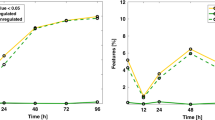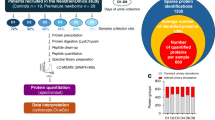Abstract
ABSTRACT: Rates of protein turnover were measured in 19 infants during the first few days of life while they were receiving i.v. glucose. The technique consisted of a continuous i.v. infusion of L-[1-13C]leucine to measure whole body leucine flux and determination of total urinary nitrogen excretion to assess leucine oxidation rates. Subsequent to each of the studies, the decision to start total parenteral nutrition (TPN) was made by the clinician concerned, with the result that seven infants did not start TPN and 12 did. There were significantly greater urinary nitrogen excretion (p < 0.001) and lower rates of whole body protein synthesis (p = 0.024) and breakdown (p = 0.015) in those who did start TPN compared with those who did not. The marked difference in nitrogen excretion between the two groups suggests that this could be a useful determinant for deciding which neonate should start TPN.
Similar content being viewed by others
Log in or create a free account to read this content
Gain free access to this article, as well as selected content from this journal and more on nature.com
or
Author information
Authors and Affiliations
Rights and permissions
About this article
Cite this article
Mitton, S., Calder, A. & Garlick, P. Protein Turnover Rates in Sick, Premature Neonates during the First Few Days of Life. Pediatr Res 30, 418–422 (1991). https://doi.org/10.1203/00006450-199111000-00005
Received:
Accepted:
Issue date:
DOI: https://doi.org/10.1203/00006450-199111000-00005
This article is cited by
-
Aggressive Early Total Parental Nutrition in Low-Birth-Weight Infants
Journal of Perinatology (2004)



